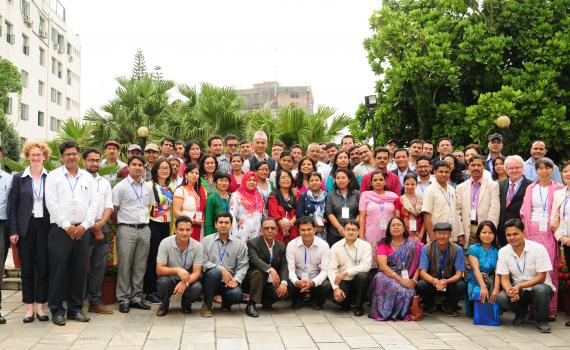
In 2015, EIFL initiated work on copyright issues for the benefit of libraries, and persons with print disabilities with our partner, the Nepal Library and Information Consortium (NeLIC).
There were two main outcomes. Civil society stakeholders decided to form a ‘Right to Read’ campaign to encourage ratification by Nepal of the Marrakesh Treaty for persons with print disabilities, and the library community was invited to dialogue with policy makers regarding copyright law more broadly in relation to library activities and services.
Background
On persons with print disabilities, the Constitution of Nepal (2015) guarantees the rights of persons with disabilities including access to education and social justice. In addition, the Disability Rights Act (2017) adopted a new rights-based approach to disability.
The Nepal Association of the Blind estimates that of the c. 40,000 school and college-age children who are blind or visually impaired, only 10% receive education. Those who do attend education are often excluded from learning because of lack of audio and Braille books. As a result, future employment prospects are very low.
Ratification of the Marrakesh Treaty by Nepal, and the introduction of provisions in national copyright law law allowing for the creation and distribution of accessible format copies, would help to realize the rights of people in Nepal with print disabilities. It could significantly increase the availability of accessible reading and learning materials, and once the law is clear on the ability to create and share accessible works, it can open the door to funding opportunities, for example, to purchase accessible screen readers and other specialist equipment, and to provide training in using accessible formats to service providers and readers.
In particular, people could benefit from the treaty’s cross-border provisions. Since many people in Nepal speak Hindi, accessible materials could be immediately imported from India (the first country to ratify the treaty in 2013). For English speakers, materials from English-speaking countries that have joined the treaty, such as Australia, Singapore and the UK may likewise be imported.
On libraries, while the 2002 Copyright Act has provisions for libraries, in many cases, they are quite restrictive and they do not properly address new technologies and services that libraries in Nepal may wish to provide today. For example, exceptions for education and preservation fall short, provisions on lending are unclear, and new issues such as orphan works, web archiving, and text and data mining are not catered for at all.
Timeline
2015 – 2017
Main activities and achievements
September 2015:
- On 3-4 September 2015, EIFL co-organized the first seminar in Nepal dedicated to library copyright issues, together with the Nepal Library and Information Consortium (NeLIC). The seminar focused on three important areas: the Marrakesh Treaty for persons with print disabilities, the development of open educational resources (OERs), and long-term preservation of knowledge. Participants had the opportunity to engage in discussion with international copyright experts.
- On 3 September 2015, the first public lecture in Nepal on copyright issues took place. Prof. Kenneth D. Crews, a keynote speaker at the seminar, gave a public lecture on International Copyright and Domestic Exceptions: WIPO, Treaties, and the Politics of Libraries', hosted by the Social Science Baha. An audio recording is available online.
- During the seminar, participants from the disability and library communities decided to form a 'Right to Read' campaign to encourage ratification of the Treaty by the government of Nepal, that committed to a process for ratification.
- On library activities and services, policy makers committed to involve libraries in future copyright law reform. In addition, a new government task force to prepare a policy on library development provides a forum for discussion on copyright and open access.
November 2015:
- EIFL supported translation from English into Nepali of key Marrakesh documents: the text of the Marrakesh Treaty, the EIFL Guide to the Marrakesh Treaty, and the World Blind Union (WBU) Marrakesh Treaty FAQs.
December 2015:
- A report published by the United Nations Development Programme (UNDP) and the World Blind Union – Asia Pacific (WBUAP) includes a legal review for the ratification of the treaty in Nepal, and recognizes the contribution of EIFL in advancing efforts towards ratification of the Marrakesh Treaty for persons with print disabilities.
January 2016:
- NeLIC participated in a an awareness raising seminar for the Marrakesh Treaty supported by WIPO that was held in Kathmandu on 27-29 January 2016. As input for the seminar, EIFL and NeLIC submitted written recommendations to the Nepal Copyright Registrar's Office for implementation of the Marrakesh Treaty into national law.
- EIFL supported the printing of Braille versions by the Nepal Association of the Blind of key Marrakesh documents translated into Nepali.
November 2016:
- Met the Registrar of Copyright and Secretary, Ministry of Culture, Tourism and Civil Aviation during WIPO's Standing Committee on Copyright and Related Rights (SCCR/33) to discuss implementation of the Marrakesh Treaty.
March 2017:
- The Marrakesh Treaty: an EIFL Guide for Libraries was published in Nepali.
Next steps
Nepal should join the Marrakesh Treaty and implement the treaty into national law. EIFL is available to support the process.





